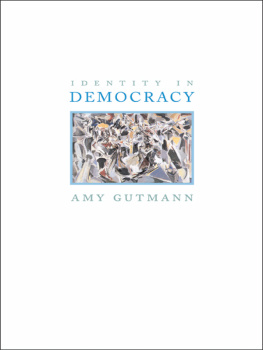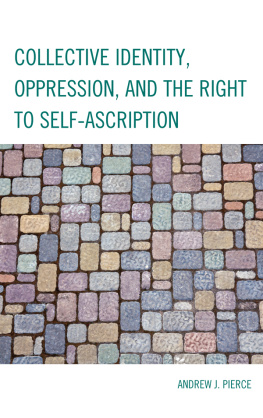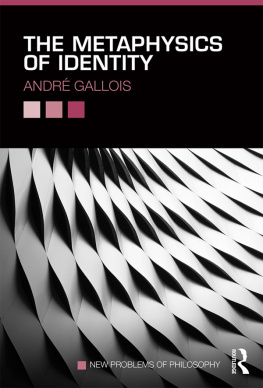Identity in Democracy
AMY GUTMANN
Identity in Democracy
PRINCETON UNIVERSITY PRESS
PRINCETON AND OXFORD
Copyright 2003 by Princeton University Press
Published by Princeton University Press, 41 William Street, Princeton, New Jersey 08540
In the United Kingdom: Princeton University Press, 3 Market Place,
Woodstock, Oxfordshire OX20 1SY
All Rights Reserved
Library of Congress Cataloging-in-Publication Data
Gutmann, Amy.
Identity in democracy /Amy Gutmann.
p. cm.
Includes index.
eISBN: 978-1-40082-552-3
1. Pressure groups. 2. Group identity. 3. Democracy. I. Title.
JF529 .G886 2003
322.4dc21
2002029338
British Library Cataloging-in-Publication Data is available
This book has been composed in Adobe Caslon
Printed on acid-free paper.
www.pupress.princeton.edu
Printed in the United States of America
10 9 8 7 6 5 4 3 2 1
FOR MICHAEL DOYLE
CONTENTS
ACKNOWLEDGMENTS
I am thankful for thoughtful comments from friends and colleagues, including Anthony Appiah, Eamonn Callan, Henry Finder, Russell Hardin, David Kahane, George Kateb, Ira Katznelson, Helen Milner, Rob Reich, Nancy Rosenblum, Ian Shapiro, Yael Tamir, Daniel Weinstock, Melissa Williams, and Alex Zakaras. From my earliest thinking and writing about identity, Dennis Thompson has made invaluable contributions to the argument of this book by reading and advising as well as encouraging me along the way. Sigal Benporath was a godsend, offering creative suggestions and excellent assistance in preparing the final version. Ian Malcolms editorial advice was exemplary. Deborah Tegarden contributed her time and expertise as production editor far beyond the call of duty. I am grateful to the Spencer Foundation for their senior scholar grant, which funded research, and to the Center for Advanced Study in the Behavioral Sciences at Stanford, where I was a fellow during the academic year 20002001, with funding from the Mellon Foundation and Princeton University. I learned from many people who offered insightful comments when I presented earlier versions of these chapters at the University of Chicago, Harvard, Michigan, Princeton, Stanford, and Utah, and the American Political Science Association Convention. The book also benefited from my being part of a diverse group on deliberative democracy, sponsored by the Social Science and Humanities Research Council of Canada. Colleagues at the University Center of Human Values have long provided intellectual and moral support. I am most grateful to Michael Doyle. This book would be far less without Michael, and so would I.
Identity in Democracy
INTRODUCTION
The Good, the Bad, and the Ugly of Identity Politics
Identity groups occupy an uneasy place in democracy. Critics emphasize how much group identities constrain rather than liberate individuals. When people are identified as black or white, male or female, Irish or Arabic, Catholic or Jew, deaf or mute, they are stereotyped by race, gender, ethnicity, religion, and disability and denied a certain individuality that comes of their own distinctive character and freedom to affiliate as they see fit. When individuals themselves identify racially, ethnically, or religiously as a consequence of being identified with groups, they often develop hostilities toward other groups and a sense of superiority over them. Groups frequently vie against one another in uncompromising ways, sacrificing justice and even peace for vindicating their superiority as a group.
If critics told the whole story, we would have little reason to doubt that identity groups are up to no good from a democratic perspective. Defenders of identity politics point out some of the problems with the critics image of the autonomous, self-made person who neither identifies nor is identified with groups. Without any group identities, defenders of group identity say individuals are atomistic, not autonomous. Group identities help individuals have a more secure sense of self and social belonging. Moreover, group identity propels women and disadvantaged minorities to counteract inherited negative stereotypes, defend more positive self-images, and develop respect for members of their groups.
What the defenders and critics of identity groups have to say is significant, but each captures only part of the relationship between identity groups and democratic politics. The relationship is far more complex yet no less important than that suggested by these and other common defenses and critiques of identity politics. People identify with others by ethnicity, race, nationality, culture, religion, gender, sexual orientation, class, disability, age, ideology, and other social markers. No single group identity or even all group identities taken together comprehend the whole of a person, yet a commonly shared identification around any of the above characteristics of a person often leads to a group identity. Group identities are as abundant in democracies as they are controversial. Politically significant associations that attract people because of their mutual identification are aptly called identity groups.
Were it not for the mutual identification of individuals with one another, there would be no identity groups. Although mutual identification is basic to human existence, it has been neglected in democratic theory, where the language of interest and interest groups (soon to be discussed), rather than identity and identity groups, is far more common. Yet no one should doubt that identification with others makes a difference in how individuals perceive their own interests. Psychological experiments demonstrate that something as basic as self-image changes when individuals identify with others. And just as remarkably, a difference in self-image can be based on a seemingly, irrelevant identification with others. Experimental subjects who view a beautiful stranger report an increase in their own self-image of attractiveness when all that they learn about the stranger is that they share her birthday. The experimental subjects apparently identify with the total stranger by virtue of sharing the same birthday, and that identification alone is enough to enable her beauty to enhance their own self-image Democratic theory and politics clearly cannot afford to neglect the differences, both positive and negative, that group identifications make in peoples lives.
What difference does the existence of organized identity groups make for democratic theory and practice? When is nationality, race, religion, gender, sexual orientation, or some other group identity a good or bad reason for democratic action? What identity groups should be encouraged or discouraged, and what actions based on identity can aid or impede democratic justice?
The analysis that follows suggests that organizing politically on the basis of group identity is not a good or bad thing in itself. When identity groups put the group above opposition to injustice or the pursuit of justice, they are morally suspect. Identity groups do better when they offer mutual support and help combat injustice for disadvantaged people. Even when combating injustice is justified, it can be ugly. A completely justifiable struggle against the rights violations of an identity group, such as the Ku Klux Klan, is often ugly, bringing with it unavoidable pain and suffering, or avoidable only at the price of appeasement. Resistance to injustice often itself encounters resistance, and people may undeservedly suffer as a consequence. By subjecting identity groups to fair-minded scrutiny, we come to recognize the good, the bad, and the ugly of identity politics.
Basic questions about the political ethics of identity groups in democracy have been conspicuous by their absence in both academic and popular discourse, for reasons that are worth noting. Because political scientists have tended to treat all organized nongovernmental political actors as interest groups, they have benignly neglected the role that group identity plays in defining and guiding many politically relevant groups in democracies. If one thinks only of identity groups that teach hatred of others, sometimes martyring their members who are willing to kill innocent people, then it is easy to condemn identity politics. But this line of thought misleadingly narrows the notion of identity groups.
Next page








